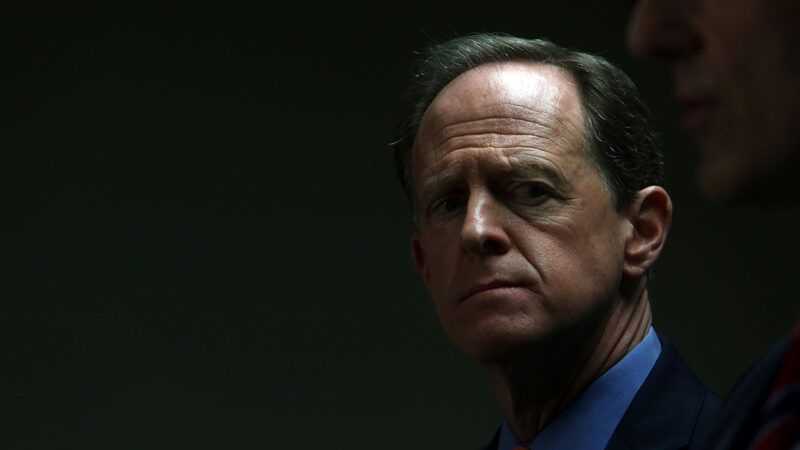Sen. Pat Toomey on Cryptocurrency and FTX's Collapse
"It's not clear that FTX would have existed, at least at its scale, if we had domestic guidelines for American companies," the former senator tells Reason.

Former Sen. Pat Toomey's time in Congress, which began in 1999 after he won a House seat in eastern Pennsylvania, officially ended on January 3 when the new Senate session began.
Toomey was described in a 2004 New Yorker profile as "a conservative Republican of rigorous doctrinal purity: anti-abortion, anti-taxes, anti-spending (except for defense); a fiscal hawk, appalled by big deficits, a crusader for school choice, tort reform, Social Security privatization, and a smaller federal government." He's still that guy, but the Republican Party has changed—so Toomey declined to run for reelection this year.
Toomey was one of a handful of senators to take an informed interest in the issues around cryptocurrency. As he prepared to exit office in December, Toomey sat down with Reason's Eric Boehm to discuss the topic.
Q: Some of your colleagues have called for new regulations on cryptocurrencies after the collapse of the FTX trading platform, but you disagree. Why?
A: We owe it to each customer to get to the bottom of the FTX implosion, and any violations of the law should be aggressively prosecuted. The Department of Justice and other enforcement agencies should expeditiously investigate the unseemly relationship between a company that was effectively a hedge fund, and an exchange entrusted with customer funds. While all the facts have not yet come to light, we've clearly witnessed wrongdoing that is almost certainly illegal.
But the wrongful behavior that occurred here is not specific to the underlying asset. What appears to have happened here is a complete breakdown in the handling of those assets. I hope we are able to separate potentially illegal actions from perfectly lawful and innovative cryptocurrencies.
To those who think that this episode justifies banning crypto, I'd ask you to think about several examples. The 2008 financial crisis involved misuse of products related to mortgages. Did we decide to ban mortgages? Of course not. A commodity brokerage firm run by former New Jersey Sen. Jon Corzine collapsed after customer funds—including U.S. dollars—were misappropriated to fill a shortfall from the firm's trading losses. Nobody suggested that the problem was the U.S. dollar and that we should ban it. With FTX, the problem is not the instruments that were used. The problem was the misuse of customer funds, gross mismanagement, and likely illegal behavior.
Q: Don't consumers need to know that they won't lose their investments if they decide to buy crypto? Is there some role for the government to play in ensuring that?
A: If Congress had passed legislation to create a well-defined regulatory regime with sensible guardrails, we'd have multiple U.S. exchanges competing here under the full force of those laws. It's not clear that FTX would have existed, at least at its scale, if we had domestic guidelines for American companies. The complete indifference to an appropriate regulatory regime by both Congress and the [Securities and Exchange Commission] has probably contributed to the rise of operations like FTX.
Congress can and should offer a sensible approach for the domestic regulation of these activities. This episode underscores the need for a sensible regulatory regime that, among other things, ensures a centralized exchange segregates and safeguards customer assets.
We could start approaching sensible regulations for cryptocurrencies by addressing stablecoins. This is an activity that my colleagues can analogize to existing, traditional finance products. There's clear bipartisan agreement that stablecoins need additional consumer protections. There are virtually none now. I've proposed a framework to do that, and I hope this framework lays the groundwork for my colleagues to pass legislation safeguarding customer funds without inhibiting innovation.
Q: As you're stepping away from Congress, what are you optimistic about?
A: I'm most optimistic about the incredible resiliency of the American economy. When I look around at the rest of the world, we wouldn't want to change places with anyone for anything.
This interview has been condensed and edited for style and clarity.

Show Comments (176)